Divorce can be a difficult and emotional process for families, especially when children are involved. It’s natural for parents to worry about how their children will cope with the changes that come with divorce. While every child’s experience is unique, research suggests that divorce can have a significant impact on a child’s behavior.
Children may respond to divorce in a variety of ways, including changes in their behavior. Some children may become more withdrawn, while others may act out in an attempt to gain attention. It’s important for parents to understand the potential behavioral changes that may occur so they can provide the necessary support and guidance to their children.

- Understanding the Impact of Divorce on Children
- Emotional Reactions in Children after Divorce
- Behavioral Changes in Young Children
- Behavioral Changes in Adolescents
- Factors Influencing Child Behavior Post-Divorce
- Coping Mechanisms and Supportive Strategies
- Seeking Professional Help for Child Behavior Issues
- Co-Parenting Strategies to Minimize Behavior Changes
- Communication and Open Dialogue with Children
- Long-Term Effects of Divorce on Child Behavior
- Conclusion


Key Takeaways:
- Divorce can potentially impact a child’s behavior.
- Children may respond to divorce in a variety of ways, including changes in their behavior.
- Parents should understand the potential behavioral changes that may occur so they can provide necessary support and guidance to their children.
- It’s important to recognize and address behavioral changes in children following divorce.
- Seeking professional help may be necessary if a child’s behavior significantly changes post-divorce.
Understanding the Impact of Divorce on Children
Divorce can have a significant impact on children, both in the short and long term. It can cause emotional and psychological distress, disrupt their sense of stability and security, and ultimately, lead to behavioral changes.
Research has shown that children of divorced parents are more likely to experience a range of negative outcomes, including depression, anxiety, and conduct problems. They may also struggle with academic performance and social relationships, both during and after the divorce.


It’s worth noting that not all children will respond to divorce in the same way. The impact will depend on a variety of factors such as the child’s age, gender, temperament, and the nature of the parent’s relationship.
“Divorce can be especially difficult for children, but it’s crucial that parents provide support and understanding as they navigate this challenging time.”
Ultimately, divorce can be a major life event that can have a lasting impact on a child’s behavior and well-being. It’s essential for parents, caregivers, and educators to be aware of the potential impact and take steps to support children through this difficult transition. In the following sections, we’ll explore the emotional reactions and behavioral changes that children may experience following divorce, as well as strategies for coping and seeking professional help.
Emotional Reactions in Children after Divorce
Divorce can be a highly emotional event for children, and it is not uncommon for them to experience a range of emotions in the aftermath. Some children may struggle with feelings of sadness, anger, confusion, and anxiety, while others may exhibit symptoms of depression or withdrawal.
It’s essential for caregivers to recognize and validate these emotions, as they can significantly impact a child’s behavior. When children’s emotional needs are left unaddressed, they may resort to negative coping mechanisms, such as acting out or becoming aggressive.
It’s important to acknowledge the unique emotional experiences that each child may have following a divorce. One child may be more vocal about their feelings, while another may find it challenging to articulate their emotions. Caregivers must remain patient and empathetic, encouraging open communication and providing a supportive environment.
As caregivers interact with children after a divorce, they may notice a range of emotional responses, including:
| Emotional Reactions | What it Looks Like |
|---|---|
| Anger | Throwing tantrums, yelling, aggressive behavior |
| Sadness | Crying, decreased interest in activities, difficulty sleeping |
| Confusion | Asking questions about the divorce, difficulty understanding changes |
| Anxiety | Fear of abandonment, general worry about the future, difficulty concentrating |
It’s crucial to remember that every child will have a unique response to their parents’ divorce. Caregivers must remain vigilant and look for signs that a child may be struggling emotionally. By providing a nurturing, supportive environment and engaging in open communication, caregivers can help children process their emotions and minimize the risk of negative behavior changes.
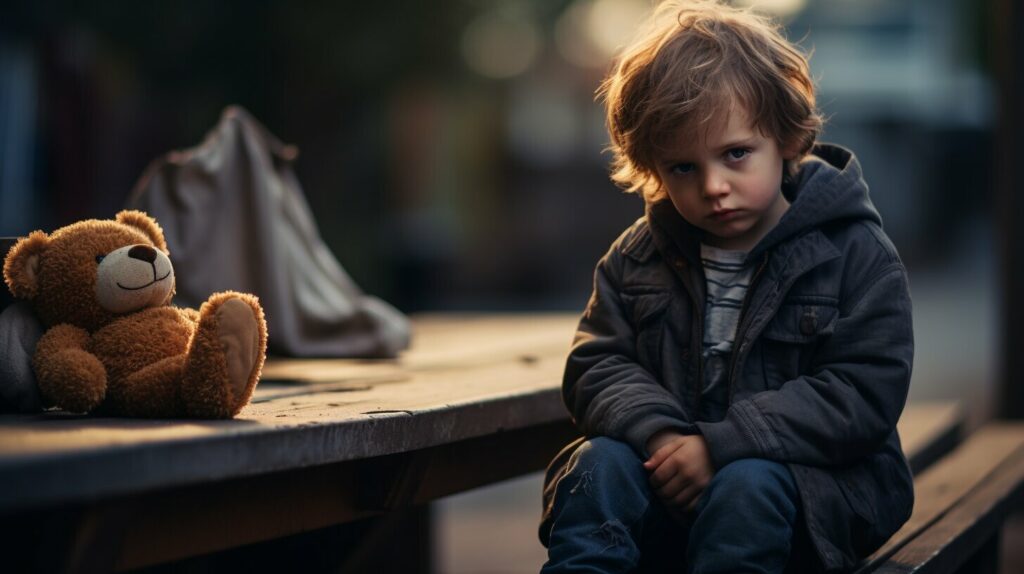

Behavioral Changes in Young Children
Young children may experience a range of behavioral changes following their parents’ divorce. These changes can be a result of the significant disruption to their sense of stability and security.
According to studies, some common behavioral changes in young children post-divorce include:
| Behavioral Changes | Description |
|---|---|
| Regression | Young children may revert to behaviors they had previously outgrown, such as bed-wetting or thumb-sucking. |
| Anxiety | Children may feel anxious about being away from one of their parents, especially during overnight visits. |
| Aggression | Some children may display aggressive behaviors such as hitting, biting, and throwing tantrums to express their emotions. |
| Withdrawn | Other children may become withdrawn, avoiding social interactions and displaying a lack of interest in their usual activities. |
It is important to note that not all children will exhibit these behaviors, and those who do may not display them consistently. However, parents and caregivers should be aware of potential signs and react appropriately.
To help minimize behavioral changes in young children post-divorce, parents can try the following strategies:
- Establish consistent routines and schedules to provide stability and predictability for children.
- Encourage open and honest communication, allowing children to express their emotions and concerns.
- Provide reassurance and emotional support, letting children know they are loved and not responsible for the divorce.
- Develop a co-parenting plan that considers the child’s needs and preferences.
By understanding the potential behavioral changes that may occur and implementing supportive strategies, parents can help ease the transition for their young children and promote their well-being.
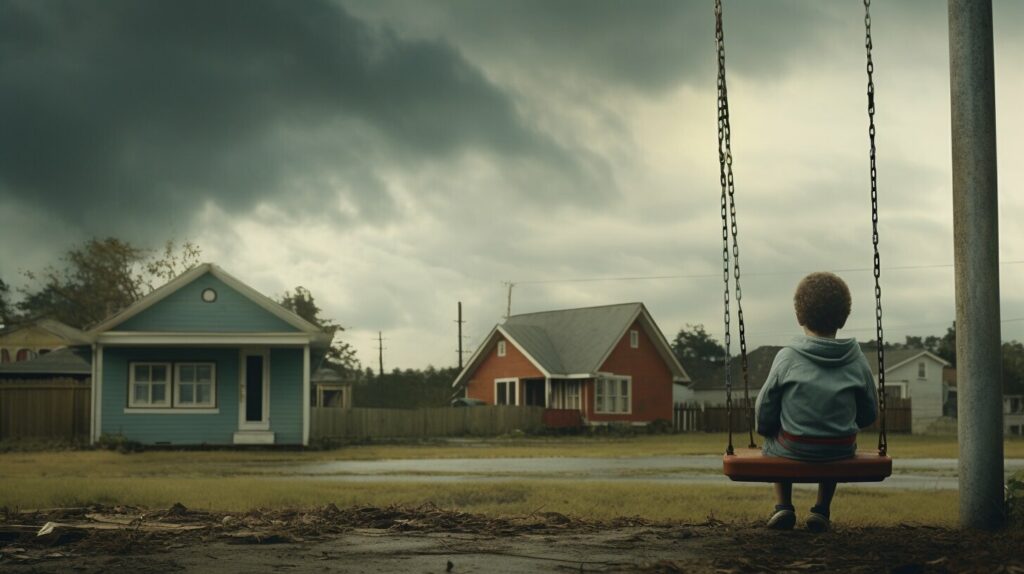

Behavioral Changes in Adolescents
Adolescence is a challenging time for most children, and the added stress of their parents’ divorce can exacerbate the typical behavioral changes that occur during this phase of development.
One significant behavioral change in adolescents following their parents’ divorce is increased conflict with authority figures, such as parents, teachers, or employers. Adolescents may feel the need to assert their independence and control, resulting in arguments or defiance.
Another common behavioral change in adolescents after divorce is withdrawal from family and friends. Adolescents may struggle to process their emotions and may isolate themselves, leading to a lack of socialization and potential depression.
An important factor in addressing these behavioral changes is providing adolescents with outlets for their emotions. This may include therapy, support groups, or simply having a trusted friend or family member to confide in.
It’s also crucial for parents and caregivers to recognize that adolescents may need more space and independence during this time. Setting clear boundaries and expectations while also respecting their needs for autonomy can help minimize conflict and behavioral changes.


“Divorce can be especially difficult for adolescents, who are already navigating the challenges of puberty and independence. By providing support and understanding, parents and caregivers can help mitigate the behavioral changes that may arise.”
Factors Influencing Child Behavior Post-Divorce
Several factors can influence a child’s behavior following their parents’ divorce. It’s essential to understand these factors to provide the necessary support to children during this time.
Age
A child’s age at the time of their parent’s divorce can significantly impact their behavior. Young children may struggle to understand the concept of divorce and may exhibit more physical and emotional reactions, such as sadness, anger, or anxiety. Adolescents, on the other hand, may experience more significant behavior changes due to their stage of development.
Parental Conflict
The amount and intensity of conflict between parents during and after their divorce can affect a child’s behavior. Children who are exposed to high levels of conflict may exhibit more behavioral problems than those who are not.
Co-parenting Arrangements
The quality of co-parenting arrangements can also affect a child’s behavior. Children whose parents have an amicable co-parenting relationship may have an easier time adjusting to the changes brought about by the divorce. In contrast, those with contentious co-parenting relationships may experience more difficulties.
Parenting Style
Parenting style can also play a role in a child’s behavior post-divorce. Children who have parents who are warm, supportive, and consistent in their parenting may have an easier time adjusting to the changes brought about by the divorce than those with parents who are inconsistent or uninvolved.
Understanding these factors and how they impact a child’s behavior can help parents and caregivers provide the necessary support to children during and after divorce. By addressing these factors, parents can help mitigate the potentially negative effects of divorce on their child’s behavior.
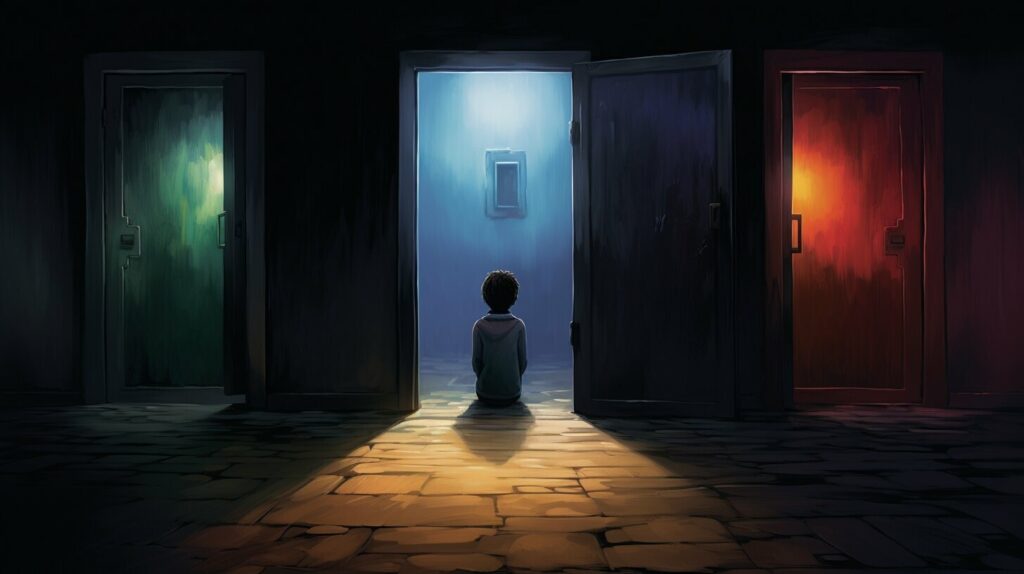

Coping Mechanisms and Supportive Strategies
Children may experience a range of emotions following their parents’ divorce, from sadness and anger to confusion and anxiety. Coping with these feelings is an essential aspect of their emotional and behavioral development. Below are some suggested coping mechanisms and supportive strategies that can help children navigate this challenging time:
Encourage self-expression:
Encouraging children to express their feelings in a safe and supportive environment can help alleviate stress and anxiety. Creating space for them to talk about their emotions, through art, play or writing, can help them process their thoughts and feelings.
Normalize their reactions:
It’s important to validate a child’s emotions and let them know that their reactions are normal. You can tell them that it’s okay to feel afraid, sad, angry, etc., and provide reassurance that they are loved and supported throughout the divorce process.
Establish a routine:
Establishing a stable and predictable routine can help children feel more secure and provide them with a sense of control amidst the chaos of divorce. It can also alleviate some of their anxieties by making their lives more predictable.
Provide opportunities for physical activity:
Physical activity, such as dancing, playing outdoors, or engaging in sports, can help children release pent-up emotions and reduce stress and anxiety. It can also promote healthy habits and increase feelings of well-being.
Seek support from trusted adults:
Encourage children to seek support from trusted adults, such as teachers, therapists, or family members, who can provide emotional support and guidance. These people can also offer additional coping strategies to help them navigate the challenges of divorce.


“Children who have a supportive environment and strong relationships with trusted adults are more likely to cope well with the changes that come with divorce.”
By implementing these coping mechanisms and supportive strategies, parents and caregivers can help children navigate the emotional and behavioral changes that can arise following a divorce. Remember that every child’s experience is unique, and it’s important to remain flexible and open to new strategies as they grow and develop. With patience, understanding, and support, children can thrive during and after the divorce process.
Seeking Professional Help for Child Behavior Issues
While divorce can be a challenging time for children, some may experience more significant changes in behavior that require professional intervention. It is important for parents and caregivers to recognize signs that a child may be struggling and seek help when needed.
Behavioral changes such as withdrawal, aggression, or depression can indicate underlying emotional issues that a child may not be able to express or cope with on their own. Professional help can provide a safe space for a child to process their feelings and develop healthy coping mechanisms.
Therapy options for children post-divorce can include individual counseling, family therapy, or play therapy, depending on the child’s age and specific needs. These sessions can also involve parents or caregivers to help them understand and support their child’s emotional well-being.
It’s important to note that seeking professional help for child behavior issues is not a sign of weakness or failure as a parent. Rather, it is a proactive step towards ensuring the best possible outcomes for a child’s mental health and development.
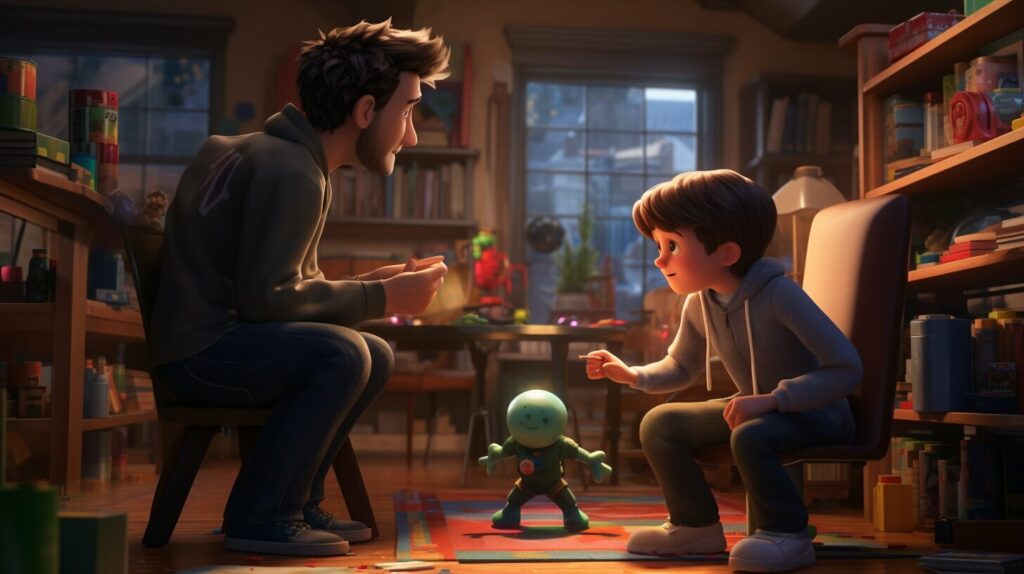

“Behavioral changes such as withdrawal, aggression, or depression can indicate underlying emotional issues that a child may not be able to express or cope with on their own.”
Co-Parenting Strategies to Minimize Behavior Changes
Effective co-parenting is vital in minimizing the behavioral changes that children may experience after a divorce. By working collaboratively, parents can create a stable and supportive environment for their children to thrive in. Here are some co-parenting strategies that can help minimize behavior changes:
- Consistency: Maintaining a consistent routine is crucial in providing a sense of stability for children. Try to keep schedules and rules consistent between households.
- Clear Communication: Open and honest communication between co-parents is essential in minimizing misunderstandings and conflicts. Ensure that your child is not put in the middle of any disagreements.
- Positive Interactions: Encourage positive interactions between your child and co-parent. When possible, attend functions and activities as a family to show your child that both parents are supportive of their life and interests.
- Respect: Respect your co-parent’s boundaries and parenting decisions. Continual conflict can negatively impact a child’s well-being and perpetuate behavioral changes.
- Flexibility: Being flexible and willing to work with your co-parent is essential in creating a supportive co-parenting relationship. Be open to discussing and adjusting schedules, routines, and parenting strategies to best support your child.


By working together, co-parents can create a positive and supportive environment for their children, minimizing the behavioral changes that may occur post-divorce.
Communication and Open Dialogue with Children
Effective communication and open dialogue with children are key to helping them navigate the changes brought about by divorce. It is essential to create an environment where children feel comfortable expressing their emotions and concerns without fear of judgment or criticism.
Start by setting aside dedicated time to talk with your children. Find a quiet and comfortable space where you can engage in a one-on-one conversation without distractions. Ask open-ended questions that encourage them to share their thoughts and feelings, such as:
- How are you feeling today?
- What has been on your mind lately?
- Do you have any questions about what’s been happening?
Listen carefully to your child’s responses and validate their emotions. It is important to acknowledge their feelings, even if you do not agree with them. Use empathetic language such as “I can understand why you feel that way” or “It’s okay to feel sad sometimes.”
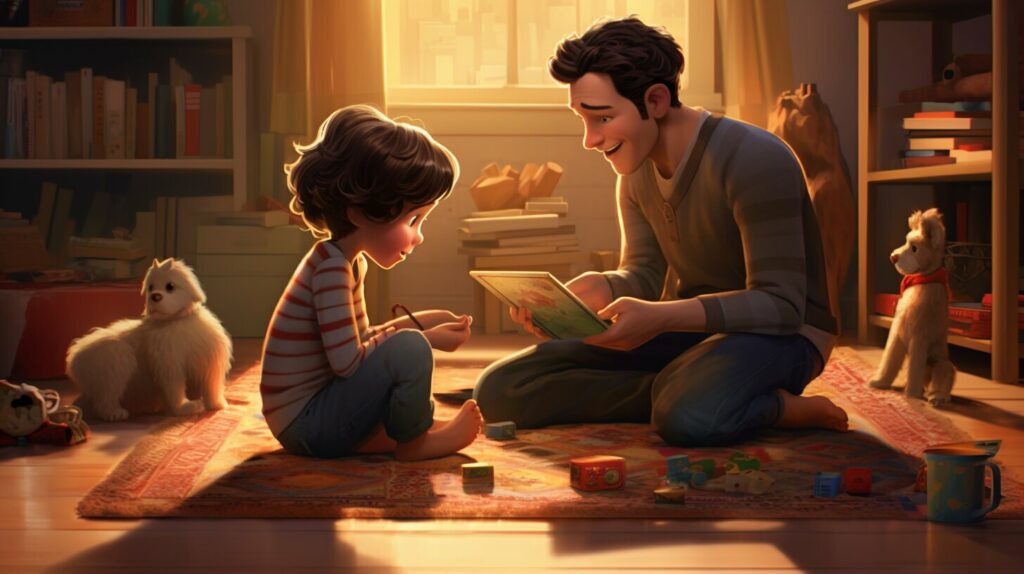

Remember to keep the conversation age-appropriate and avoid oversharing information that may be too complex or overwhelming for your child to understand. Be honest and truthful, but also considerate of their emotional well-being.
Encourage your child to ask questions and participate in the conversation. Let them know that it’s okay to have different opinions and that you are always available to talk whenever they need.
“Effective communication with children is not just about talking to them, it’s also about actively listening and validating their emotions.”
By fostering open dialogue and effective communication, you can help your child feel supported and understood during this challenging time. This can go a long way towards mitigating any behavioral changes they may be experiencing, and promoting their long-term emotional and mental wellbeing.
Long-Term Effects of Divorce on Child Behavior
While there is no doubt that divorce can have a significant impact on a child’s behavior in the short-term, it is essential to consider the potential long-term effects as well. Research has shown that children of divorced parents may experience a range of emotional and behavioral challenges into adulthood.
One long-term effect of divorce on child behavior is an increased risk of mental health disorders, such as depression and anxiety. Children who experience parental divorce early in life may struggle with these challenges throughout their adolescent and adult years.
“Children of divorced parents may experience a range of emotional and behavioral challenges into adulthood.”
Divorce can also impact a child’s ability to form healthy relationships later in life. Children of divorced parents may have a skewed perception of relationships and struggle with trust and intimacy as a result.
Furthermore, research suggests that children of divorced parents may have a higher risk of engaging in risky behaviors, such as substance abuse and early sexual activity. These behaviors may be linked to the disruption of family dynamics and the emotional strain that children experience during and after a divorce.
It is important to note that not all children will experience long-term effects of divorce on their behavior. However, it is crucial to remain aware of the potential risks and to provide ongoing support and resources to children who may be struggling.
Co-parenting strategies and therapy can be effective tools for mitigating the long-term effects of divorce on child behavior. Providing a stable and supportive environment, promoting open communication, and nurturing healthy relationships can all contribute to helping children thrive in the years following a divorce.
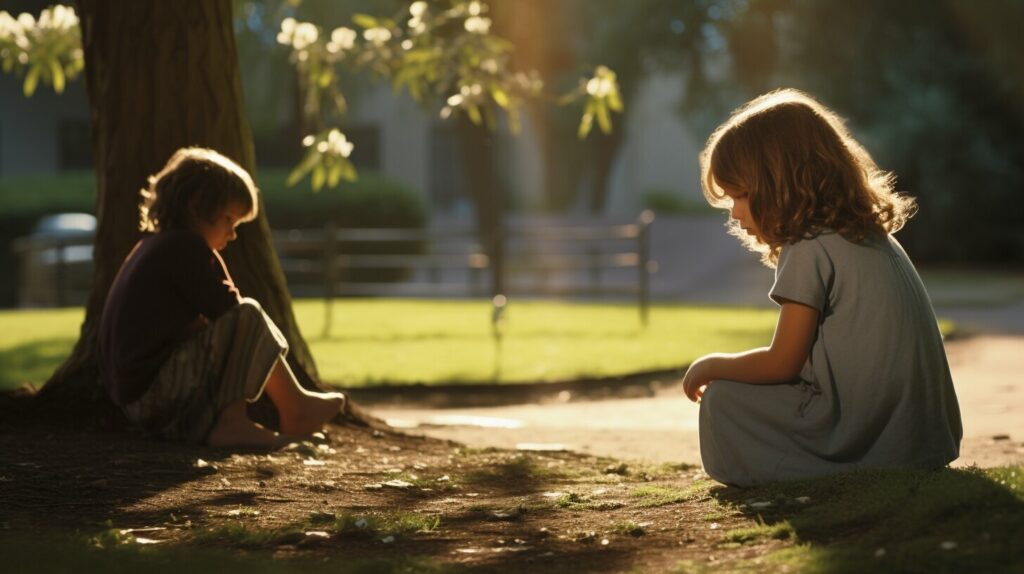

In conclusion, divorce can have a significant impact on a child’s behavior both in the short-term and the long-term. While some children may be more resilient than others, it is essential to remain aware of the potential risks and to provide ongoing support and resources to help them navigate these challenges. With the right strategies and tools in place, children can emerge from divorce with a strong sense of stability and resilience that will serve them well into adulthood.
Conclusion
In conclusion, divorce can have significant impacts on a child’s behavior, emotions, and overall well-being. It is essential to be aware of the potential changes that children may experience post-divorce and take necessary steps to support them through this transition.
Parents and caregivers can play a crucial role in minimizing behavioral changes by practicing effective co-parenting strategies, engaging in open and age-appropriate communication with their children, and seeking professional help when necessary.
Long-term effects of divorce on a child’s behavior are well-documented, highlighting the importance of ongoing support and understanding as children continue to navigate the aftermath of divorce.
It is vital to remember that every child is unique, and their responses to divorce will vary. As such, there is no one-size-fits-all solution to addressing the behavioral changes that may occur. By remaining empathetic, providing a stable environment, and seeking appropriate support, parents and caregivers can help their children develop the resilience needed to thrive in the face of adversity.



FAQ
How does divorce affect a child’s behavior?
Divorce can have a significant impact on a child’s behavior. It can disrupt their sense of stability and security, leading to behavioral changes such as aggression, withdrawal, or acting out.
What emotional reactions might children have after their parents’ divorce?
Children may experience a range of emotional reactions after their parents’ divorce, including sadness, anger, confusion, and anxiety. It’s important to acknowledge and address these emotions to help them navigate this difficult time.
Are there specific behavioral changes that young children may exhibit after a divorce?
Yes, young children may display behavioral changes such as regression in toilet training, increased clinginess, changes in sleep patterns, or difficulty concentrating. Recognizing these changes can help provide appropriate support.
How does divorce affect the behavior of adolescents?
Adolescents may exhibit behavioral changes such as rebellion, school performance issues, risk-taking behavior, or withdrawal. It’s important to provide them with guidance and support during this challenging stage of development.
What factors can influence a child’s behavior after their parents’ divorce?
Several factors can influence a child’s behavior post-divorce, including the level of parental conflict, the quality of co-parenting relationships, the stability of post-divorce arrangements, and the support network available to the child.
What coping mechanisms and supportive strategies can help children navigate the changes brought about by divorce?
Children may employ coping mechanisms such as seeking social support, engaging in creative outlets, or expressing their emotions. Adults can offer support by maintaining routines, encouraging open communication, and providing a safe and nurturing environment.
When should I seek professional help for my child’s behavior issues after divorce?
If your child’s behavior significantly changes after divorce and it is impacting their daily life, it’s important to seek professional help. Therapists and counselors can provide specialized support and interventions tailored to your child’s needs.
What co-parenting strategies can minimize behavior changes in children after divorce?
Effective co-parenting strategies include maintaining consistent rules and routines across households, encouraging positive communication between parents, and prioritizing the child’s well-being over parental conflicts.
How can I communicate openly with my child about divorce?
Open and honest communication is crucial during and after divorce. Engage in age-appropriate conversations, listen actively to your child’s concerns, validate their emotions, and assure them that their feelings are valid and understood.
What are the potential long-term effects of divorce on a child’s behavior?
The long-term effects of divorce on a child’s behavior can vary. While some children may experience lasting emotional and behavioral difficulties, others may adapt well over time. Ongoing support and understanding are essential in helping children navigate the long-term effects of divorce.





Leave a Reply